Chapter5 Idioms, Proverbs and Allusions
- 格式:ppt
- 大小:1.38 MB
- 文档页数:61
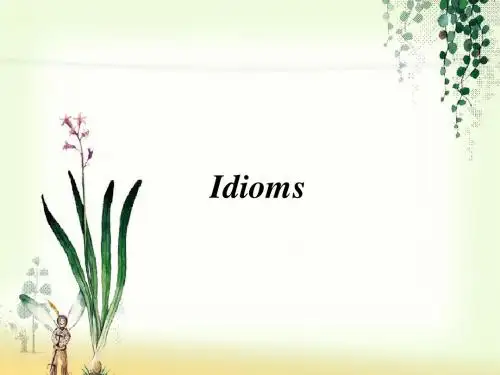
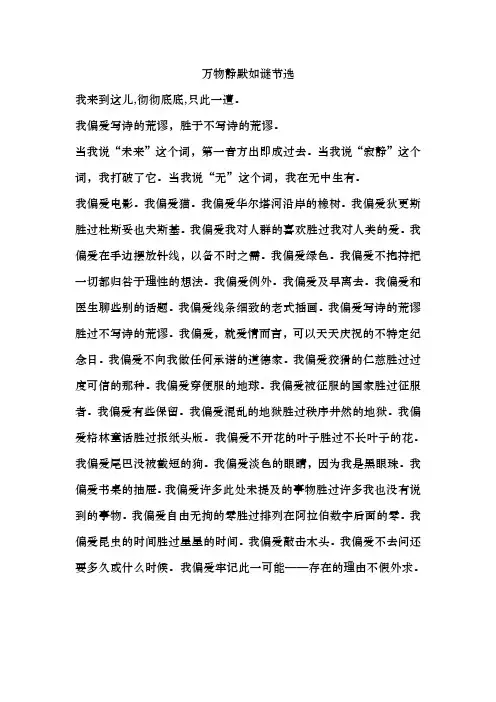
万物静默如谜节选
我来到这儿,彻彻底底,只此一遭。
我偏爱写诗的荒谬,胜于不写诗的荒谬。
当我说“未来”这个词,第一音方出即成过去。
当我说“寂静”这个词,我打破了它。
当我说“无”这个词,我在无中生有。
我偏爱电影。
我偏爱猫。
我偏爱华尔塔河沿岸的橡树。
我偏爱狄更斯胜过杜斯妥也夫斯基。
我偏爱我对人群的喜欢胜过我对人类的爱。
我偏爱在手边摆放针线,以备不时之需。
我偏爱绿色。
我偏爱不抱持把一切都归咎于理性的想法。
我偏爱例外。
我偏爱及早离去。
我偏爱和医生聊些别的话题。
我偏爱线条细致的老式插画。
我偏爱写诗的荒谬胜过不写诗的荒谬。
我偏爱,就爱情而言,可以天天庆祝的不特定纪念日。
我偏爱不向我做任何承诺的道德家。
我偏爱狡猾的仁慈胜过过度可信的那种。
我偏爱穿便服的地球。
我偏爱被征服的国家胜过征服者。
我偏爱有些保留。
我偏爱混乱的地狱胜过秩序井然的地狱。
我偏爱格林童话胜过报纸头版。
我偏爱不开花的叶子胜过不长叶子的花。
我偏爱尾巴没被截短的狗。
我偏爱淡色的眼睛,因为我是黑眼珠。
我偏爱书桌的抽屉。
我偏爱许多此处未提及的事物胜过许多我也没有说到的事物。
我偏爱自由无拘的零胜过排列在阿拉伯数字后面的零。
我偏爱昆虫的时间胜过星星的时间。
我偏爱敲击木头。
我偏爱不去问还要多久或什么时候。
我偏爱牢记此一可能——存在的理由不假外求。
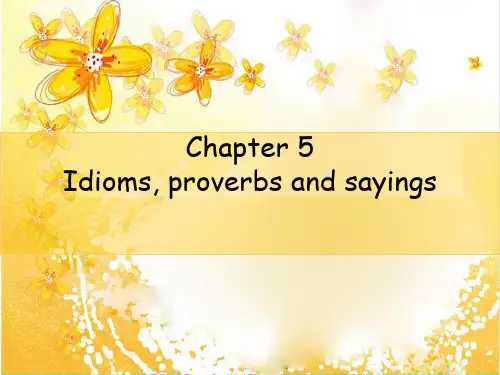
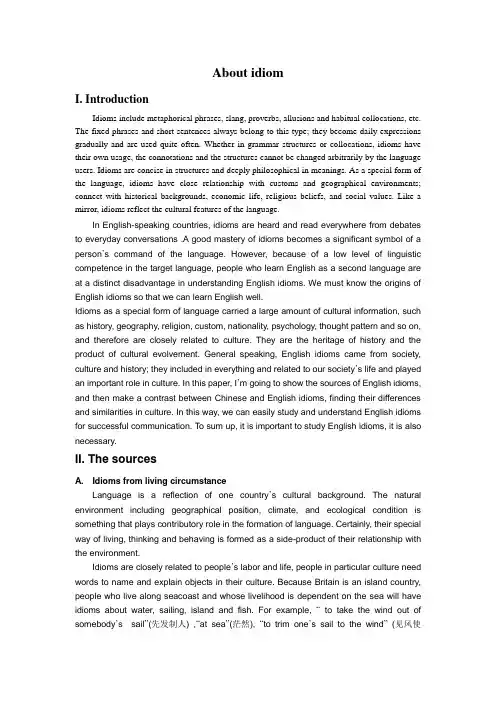
About idiomI. IntroductionIdioms include metaphorical phrases, slang, proverbs, allusions and habitual collocations, etc. The fixed phrases and short sentences always belong to this type; they become daily expressions gradually and are used quite often. Whether in grammar structures or collocations, idioms have their own usage, the connotations and the structures cannot be changed arbitrarily by the language users. Idioms are concise in structures and deeply philosophical in meanings. As a special form of the language, idioms have close relationship with customs and geographical environments; connect with historical backgrounds, economic life, religious beliefs, and social values. Like a mirror, idioms reflect the cultural features of the language.In English-speaking countries, idioms are heard and read everywhere from debates to everyday conversations .A good mastery of idioms becomes a significant symbol of a person’s command of the language. However, because of a low level of linguistic competence in the target language, people who learn English as a second language are at a distinct disadvantage in understanding English idioms. We must know the origins of English idioms so that we can learn English well.Idioms as a special form of language carried a large amount of cultural information, such as history, geography, religion, custom, nationality, psychology, thought pattern and so on, and therefore are closely related to culture. They are the heritage of history and the product of cultural evolvement. General speaking, English idioms came from society, culture and history; they included in everything and related to our society’s life and played an important role in culture. In this paper, I’m going to show the sources of English idioms, and then make a contrast between Chinese and English idioms, finding their differences and similarities in culture. In this way, we can easily study and understand English idioms for successful communication. To sum up, it is important to study English idioms, it is also necessary.II. The sourcesA. Idioms from living circumstanceLanguage is a reflection of one country’s cultural background. The natural environment including geographical position, climate, and ecological condition is something that plays contributory role in the formation of language. Certainly, their special way of living, thinking and behaving is formed as a side-product of their relationship with the environment.Idioms are closely related to people’s labor and life, people in particular culture need words to name and explain objects in their culture. Because Britain is an island country, people who live along seacoast and whose livelihood is dependent on the sea will have idioms about water, sailing, island and fish. For example, “to take the wind out of somebody’s sail”(先发制人) ,“at sea”(茫然), “to trim one’s sail to the wind”(见风使舵),“never offer to teach fish to swim”(不要班门弄斧),“full fish”(乏味的人),“sail under false colors”(欺世盗名)(庄和诚,2002. P572),etc. What’s more, climate, agriculture are also another factor in the living condition. While Britain is located in western hemisphere, with North T emperate Zone and marine climate, so “west wind” is the symbol of spring. The west wind blows from the Atlantic Ocean is warm and gentle, so that Britain abounds in rain can be proved in some idioms concerning rain: “to make hay while the sun shines”(趁热打铁), “to rain or shine”(无论如何), “rainy day”(穷困时期), “as right as rain”(非常正确)etc.The British people are good at hunting and fishing; they often use horses working in the field, so they made their way of life and made of production. There are many idioms from agriculture. E.g ,“beat around/about the bush”(拐弯抹角)(高凌,2002.10. p43)this from hunting, “a hard row to hoe”(难办的事情), “have all one’s eggs in one basket”(孤注一投), “put out to grass”(年老退休), “ride on the high horse”(盛气凌人), “feel like a fish out of water”(感到不自在).B.Idioms from religions and beliefsAs a cultural phenomenon, religion, which is the manifestation of cultures, is the vital part of human thought .Religion is an important source for idioms. Most of westerners are Christians, who believe that the world was created by God. They think that God is omnipotent and sacred. God, Christ, devil, Adam and some educational segments of the stories in Bible are passed down, because of people’s favor or even some historical and political causes, especially religious beliefs. Many British who believe in Christianity all read the Bible; therefore, numerous idioms have come into people’s colloquial speech, and have become mottoes. For example: “Judas’s kiss”(犹大之吻) from the Matthew, Judas, one of the Twelve, agrees to betray Jesus that the chief Priests counted out for him only thirty silver coins. A kiss as the betrayer had arranged a signal with the chief Priests. Jesus had crucified, and then died. So, Judas’s kiss means “with the best of intention or forsake. “Turn the other cheek”(甘受侮辱)from the New Testament, Jesus’advice: Resist not evil, but whosoever shall smite thee on thy right cheek, turns to him the other also. “Build up on the sand”(根基不牢)from the Matthew: “…and doeth them not, shall be likened unto a foolish man, which built his house upon the sand……”in it, “build upon the sand” metaphorical meaning is unstable foundation. There are quite a few English Idioms from religion. Such as: “Benjamin’s mess(最大的份额), “raise Cain apple of Sodom(金玉其表,败絮其中),“handwriting on the wall”(不祥之兆), “God preserve us”(神明保佑)(骆世平,2005. 2.2)etc.C. Idioms from historical allusionBritain as an ancient country passes a long history, which mainly comprises allusion, myths, poem, ancient books and records etc. Among them, allusion is the most important, it reflects the national characteristic. Idioms from history culture are the gems of human cultural heritage. It is worthwhile for us to learn them well. English idioms have their legends and anecdotes about historical figures which have provided rich and variedmaterials, and consequently give a national color to the idioms. It is necessary for us to learn and use the English allusion, it can enlarge our scope of knowledge, widen our field of vision, and it is useful to learn about the idioms’ origin. Maybe we can learn it by its historical events, fables, mythologies and literary works.1. Historical events and folk storiesIn most language, people embellish their speech or writing with references to characters or event from their history, that is to say, idiomatic expressions are closely related to a country’s history. English has a history more than thousand years and has some idioms from historical. For example: “to meet one’s Waterloo”(遭遇滑铁卢)is from the defeat of Napoleon at Waterloo in 1815,which means to be completely defeated. “Dunkirk evacuation”(敦刻尔克撤退)from the world War II and originally meet the retreat of the English-French troops forced by the German now, the expression means to retreat in disorder. “Columbus’s egg”(哥伦布竖鸡蛋),in the famous story of Columbus’s egg, the explorer, irritated at being told that his exploits were easy, challenged the guests at a banquet to balance an egg on its end, when all had failed, he succeeded by flattening one end by tapping in against the table, a trick that any would than have been able to repeat, its means repetition is easier than innovation.As we all know, Rome and Denmark once occupied Britain for a long time, so the conquest influenced on the Britain to a certain extent: “Six of one and half a dozen of the other”(半斤八两)came from Denmark, whereas “return to one’s muttons”(言归正传)and “do in Rome as the Roman’s do”(入乡随俗)are from France and Rome respectively. Of course, the history of mankind is almost the history of war, which is the source of numerous idioms, as is mirrored in the following: “What millions died that Caesar might be great”(一将功成万骨枯) ,“to put up the sword”(讲和)etc.We can’t sure that if the folk story is true or not, but as a part source of English Idioms, we would rather believe it is a true story, like “eat crow”(被迫认错) “fight like silken cats”(两败俱伤).There is an interest story told that one night, a wife hears a mouse sound in their room, so she asks her husband to drive mouse away, but the man says the door is so cold, he gets cold feel, he will not get up to do anything. In fact, the husband is not because the door cold, but also is afraid the mouse.2. Fable and mythologiesIdioms are usually closely related to distinctive cultural fables and mythologies. As a part of English idioms, though ancient fable stories are short and refined, they teach people many philosophic and educational theories while being narrated. They are also parts of the kindergarden education of children. E.g: “Sour grapes”(酸葡萄)—disparage something that is beyond one’s reach. The allusion is to Aesop’s well-known fable of the fox, which tried in vain to get at some grapes, but when he found they were beyond his reach, he went away saying, “I see they are sour”. “Grin like the Cheshire cat”(咧嘴傻笑),in a children’s story, there is a Cheshire cat kept smiling innocently, so people todescribe someone’s stupid smile as grin like the Cheshire cat. “Alice in wonderland”(幻想的)came from Lewis Carroll’s work Alice’s Adventure in wonderland.As we all know, Greek and Roman civilizations have a great influence on the English language, so the Greek and th e Roman mythologies have greatly enriched the English Idioms. Most English allusion came from the Greek Rome mythology. Le t’s take a glance at following idioms. “Achilles’ heel”(致命弱点)which is from the Greek mythology has the meaning: the one weak spot in a man’s circumstances or character”. “A Pandora’s box”(潘多拉魔盒)(骆世平,2005. 2.4.1)which means the origin of all evils, is also from Greek mythology. Another example, Hercules was one of the most famous heroes in Greek mythologies. He killed two snakes when he was a baby, and was known as a man of muscle. Because of this, he “walks” into the English idioms: “Hercules choice”(永存,不朽), “the Hercules efforts”(费九牛二虎之力), “the pillars of Hercules”(天涯海角). Aesop’s Fable have a greatly influence in English idioms, e.g: “Aladdin’s lamp”(能产生神奇效果的东西)came from Aladdin and the wonderful lamp in Thousand and one Nights. In the story, Aladdin gained a magic lamp and a ring that he was able to call all deities to do anything that he wanted. Another examples, “an open sesame”(芝麻开门)from AliBaba and Forty Thieves.3. .Literary worksMany popular western literary masterpieces have the classic words, phrases and sentences that attract people greatly. They are shaped to evolve the hidden meanings; they are also one of the main sources of English idioms. In English literature, Shakespeare plays a very important role, his dramas are the major source of this kind: “Applaud one to the echo”(掌声雷动)(卢思源,2006.),“die in harness”(因公殉职),“make assurance doubly sure”(加倍小心),“at one fell swoop”(一举,一下子),“have an old head on young shoulders”(年轻却有头脑),“to claim one’s pound of flesh”(割某人的一磅肉),“out of joint”(杂乱无章),“a horse of different color”(截然不同的事或人),etc. Besides the works of other famous writers also store a great many idioms: “a nine-day wonder”(昙花一现)appears in Troilus and Cressida written by Geoffrey Chaucer; “mind one’s eye”(当心你的眼睛)from Charles Dickens’s Barnaby Ridge; “the ugly duckling”(丑小鸭)is from Han Anderson’s tables; “Friday”(星期五)means faithful, is from Robinson Crusoe written by Daniel Defoe. Many English idioms were came from literary works with which we all familiarity.D. Idioms from traditions and customsCulture is long acquired from customs and habits. These customs and habits are representative of the way of living of a certain speech community and they are mirrored in the habitual speaking of the language. Food is one of the aspects of cultural tradition that are reflected in English idioms. In most European countries, bread, butter, jam, cheese, etc, are usual kind of food in daily meals. On the other hand, animals, sporting and daily life are also made so many idioms. So in English ,there are some idioms like: “bread and butter”(日常所需)(骆世平,2005. 2.6.3),“hard cheese”(倒霉), “to butter both sides of one’s bread”(过舒适的生活), “clever dog” means a clever boy or guy. “To help a lame dog over a stile”(雪中送炭) ,“love me, love my dog”(爱屋及乌),“dogdays”(伏天),“as strong as an ox”(很健壮) ,“birds of a feather”(性格不同的人),“in the money”(获奖),“off and running”(进展顺利),“chuck in one’s cards”(认输),“throw in the towel”(投降), “jump the gun”(抢先),“toe the line”(服从命令),etc. Others ,we can learn some new idioms from Walt Disney, for example, “Mickey Mouse”(米老鼠): Small, insignificant.III. ComparisonUsing language in such communication, we often come across some idioms with distinctive cultural characteristics. So it is a very importance and complicated thing for us to understand these idioms correctly. So, we should have a comparison between English and Chinese idioms through their differences and similarity.A. Differences between English and Chinese idioms1. Geographical difference.Geographical environment plays an important role in shaping one country’s culture and human beings have no choices and opacities to change the geography. As a result, idioms based on geographical features appear differences between different countries.Britain is an island country, which does not share land border with any other country except the Republic of Ireland. So, Britain people have a special passion for water. However, the most part of China belongs to inland place where people cannot live without earth. This made difference idioms in the two languages. For example, there is a Chinese idiom showing somebody being extravagant, “挥金如土”,but in English idiom is “spend money like water”;“Don’t cross the bridge till you come to it”(车到山前必有路), “between the devil and the deep sea”(进退维谷), “all is fish that comes to one’s net”(抓到篮里便是菜).2 . Conventional differencesOne nation’s custom is formed through a long history and firmly rooted in people’s mind. It is closely related to national psychology and acts as an important source of idioms. In different countries and nations customs drastically differ in various aspects. Due to that, a lot of idioms turn out with varied dress.Take food habit for example, cake has been a common food in English for a long history. On the other hand, dishes are common in China, so ,in English idiom “a piece of cake” is tell the same meaning like(小菜一碟)in Chinese. Other examples are related to the habitual way of working in the field. E.g.: Chinese say “力大如牛”while English say “as strong as a horse”.3.. Religious differencesNumerous idioms were generated from the function of religion. Religion which exists in every country and nation affects much in people’s belief and life, especially before the modern civilization. The people in different countries mostly believe in different schools of religion. Therefore some differences of idioms between Chinese and English can betraced back to the origin of religion. Religion played a key role in English society, especially before capitalization, innumerable idioms are originated from the Bible, such as “to put new wine in old bottles”(旧瓶装新酒)(庄和诚,2002,p447),“my God”(上帝), “to make one’s hair stand on end”(使人毛骨悚然), besides, the idiom “as poor as a church mouse”(一贫如洗)is also somewhat influenced by religion. Be different from Britain culture, Chinese culture evolved from Confucian School, Taoist School. There are traces of Taoist principles and Confucian principles in Buddhist doctrines. A large number of Chinese idioms can be traced back to Buddhist School. Such as “道高一尺,魔高一丈”(where God has his church, the devil will have his chapel), “临时抱佛脚”(seek help at the last moment), ”佛法无边”(the powers of Buddha are unlimited) (顾曰国,1997.9 p.285),”一尘不染”(as clean as Whistle)(徐栋良,高红,2004 p.6).B.Similarities between English and Chinese idiomsAlthough there are many differences between English and Chinese idioms origin, they also have some similarities. Sometimes, we can borrow them each other so that our communication would be changed frequently and easily. For example, as we all know, LiangShanBo and ZhuYinTai were lovers, but as foreigners, they don’t understand its meanings, maybe they don’t know about the story. How would we explain for them? In such condition, if we have borrowed their culture to introduce it, we can tell them like this: they are Romeo and Juliet in China. I believe that they can understand the love story without any difficulty. Others, “the emperor of Qin- Dynasty” j ust like “Caesar” in westerner. “Damon of Pythias”, which some men urge to translate it directly, while other men believe that translating it into men believe friendship unto death(莫逆之交)or friends who are willing to die for one another is better(刎颈之交). Because the majority of Chinese do not know Damon and Pythias, we can explain them into GuanZhong and BaoShuYa in Chinese may enable the Chinese easily to understand. “There are the Greek gifts for you”(希腊人的礼物) just like the similar Chinese idiom “the yellow weasel goes to his respects to the hen—with the best of intention (黄鼠狼给鸡拜年—不安好心),“Burn one’s boat” just like(破釜沉舟)in Chinese.。
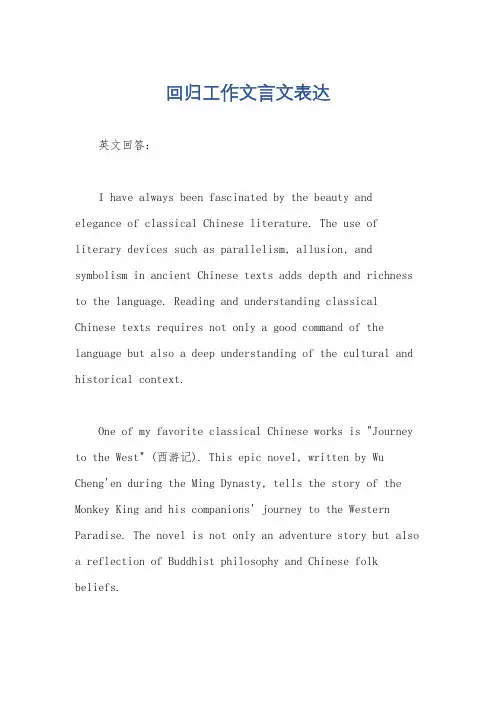
回归工作文言文表达英文回答:I have always been fascinated by the beauty and elegance of classical Chinese literature. The use ofliterary devices such as parallelism, allusion, and symbolism in ancient Chinese texts adds depth and richness to the language. Reading and understanding classical Chinese texts requires not only a good command of the language but also a deep understanding of the cultural and historical context.One of my favorite classical Chinese works is "Journey to the West" (西游记). This epic novel, written by Wu Cheng'en during the Ming Dynasty, tells the story of the Monkey King and his companions' journey to the Western Paradise. The novel is not only an adventure story but also a reflection of Buddhist philosophy and Chinese folk beliefs.The use of idioms and proverbs in classical Chinese literature is another aspect that I find intriguing. These expressions not only convey meaning but also carry cultural connotations. For example, the idiom "一箭双雕" (one arrow, two eagles) is used to describe a situation where one action achieves two goals. This idiom is not only a concise way of expressing an idea but also reflects the Chinese value of efficiency.中文回答:我一直对古典文言文的美丽和优雅深感着迷。
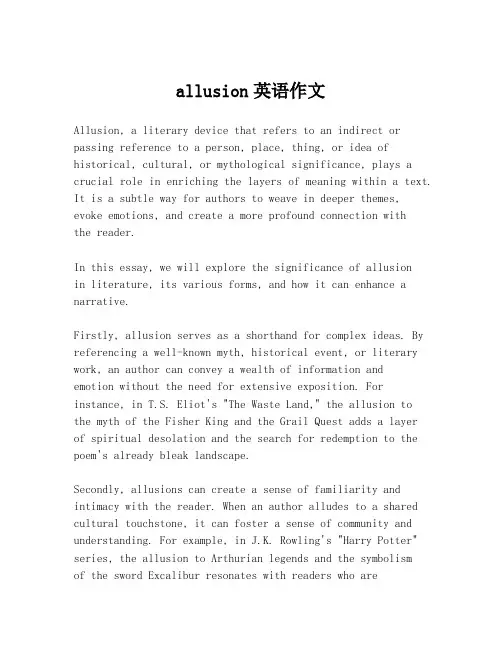
allusion英语作文Allusion, a literary device that refers to an indirect or passing reference to a person, place, thing, or idea of historical, cultural, or mythological significance, plays a crucial role in enriching the layers of meaning within a text. It is a subtle way for authors to weave in deeper themes, evoke emotions, and create a more profound connection withthe reader.In this essay, we will explore the significance of allusionin literature, its various forms, and how it can enhance a narrative.Firstly, allusion serves as a shorthand for complex ideas. By referencing a well-known myth, historical event, or literary work, an author can convey a wealth of information andemotion without the need for extensive exposition. For instance, in T.S. Eliot's "The Waste Land," the allusion tothe myth of the Fisher King and the Grail Quest adds a layerof spiritual desolation and the search for redemption to the poem's already bleak landscape.Secondly, allusions can create a sense of familiarity and intimacy with the reader. When an author alludes to a shared cultural touchstone, it can foster a sense of community and understanding. For example, in J.K. Rowling's "Harry Potter" series, the allusion to Arthurian legends and the symbolismof the sword Excalibur resonates with readers who arefamiliar with the tales of King Arthur, thus deepening their engagement with the story.Moreover, allusion can be a tool for satire and critique. By alluding to a certain figure or event, an author can subtly comment on contemporary society or critique the original context of the allusion. In Oscar Wilde's "The Importance of Being Earnest," the allusion to Victorian social norms andthe figure of the dandy serves to mock the superficiality and hypocrisy of the era.Allusions can take various forms, such as historical allusions, which reference past events or figures;mythological allusions, which draw from a culture's mythology; biblical allusions, which refer to stories and charactersfrom the Bible; and literary allusions, which invoke other works of literature.In conclusion, allusion is a powerful literary device thatcan add depth, richness, and nuance to a text. It allows authors to communicate complex ideas succinctly, engage with the reader on a deeper level, and provide commentary onsociety and culture. Understanding and recognizing allusions can greatly enhance one's appreciation of literature,revealing the intricate tapestry of references that authors weave into their works.。
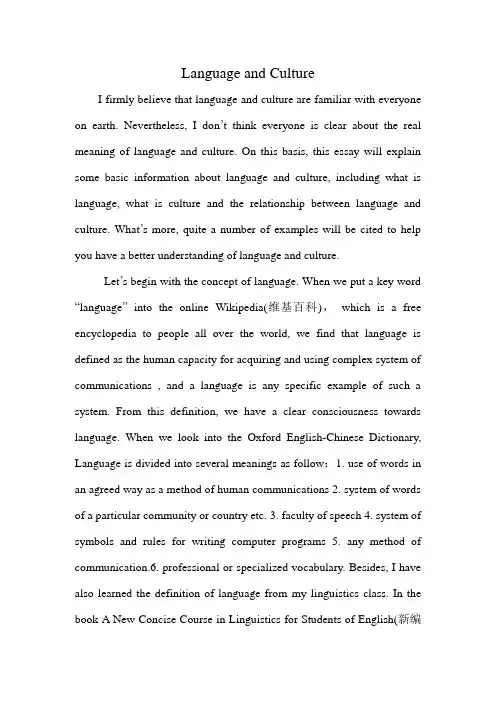
Language and CultureI firmly believe that language and culture are familiar with everyone on earth. Nevertheless, I don’t think everyone is clear about the real meaning of language and culture. On this basis, this essay will explain some basic information about language and culture, including what is language, what is culture and the relationship between language and culture. What’s more, quite a number of examples will be cited to help you have a better understanding of language and culture.Let’s begin with the concept of language. When we put a key word “language”into the online Wikipedia(维基百科),which is a free encyclopedia to people all over the world, we find that language is defined as the human capacity for acquiring and using complex system of communications , and a language is any specific example of such a system. From this definition, we have a clear consciousness towards language. When we look into the Oxford English-Chinese Dictionary, Language is divided into several meanings as follow:1. use of words in an agreed way as a method of human communications 2. system of words of a particular community or country etc. 3. faculty of speech 4. system of symbols and rules for writing computer programs 5. any method of communication.6. professional or specialized vocabulary. Besides, I have also learned the definition of language from my linguistics class. In the book A New Concise Course in Linguistics for Students of English(新编简明英语语言学教程). Langue is thought to be a system of arbitrary vocal symbol used for human communication. Short as it is, this definition has captured the main features of language. First of all, language is a system, that is, elements of language are combined according to rules. Second, language is arbitrary in the sense that theme is no intrinsic connection between a linguistic symbol and what the symbol stands for. This conventional nature of language is well illustrated by a famous quotation: A rose by any other name would smell as sweet. This quotation means rose is still rose even it is called by another name.For my part, the definition of language is varied. Generally speaking, it is a series code that facilitates human communication. And beyond a specific context, language has no intrinsic meaning.After finishing talking about what is language, let’s know more about culture. Similarly, in the Wikipedia, culture is defined as fallowing meanings, Firstly, culture is deemed as a modern concept based on a term first used in classical antiquity by the roman orator Cicero: Cultura animi ( cultiration of the soul). Secondly, the term “culture”in American anthropology had two meanings: the evolved human capacity to classify and represent experiences with symbol, and to act imaginatively and creatively. Thirdly, Hoebel describes culture as an integrated system of learned behavior patterns and which are not a result of biological inheritance. Besides, we learn the meaning of culture from theIntercultural Communication course. Culture is defined as the group of people who share the same ancestry. There are also many renowned socialists give culture several definitions. For example, E.sapir once said that culture may be defined as what a societu does and thinks.Shortly, culture is involved in so many aspects that it is hard to give it an accurate definition. Put in another way, for different people, culture has very different meaning, according to their own value, education background, social status and so forth. So there is nothing to criticize when other’s understanding of culture is different from yours.Having known so much basic information about language and culture, we will have look at the relationship between language and culture. In the book Intercultural communication in English(新编跨文化交际英语),there is a description of the relationship between language and culture. It goes like this: culture and language are intertwined and shape each other. Language is not a matter of neutral codes and grammatical rules. Each time we select words form sentences, and send a message, either oral or written. We also make cultural choices. We all agree that language helps in communication with people from different backgrounds. However, we may be less aware that cultural literary is necessary to understand the language being used. Personally speaking, language and culture is not two totally different subjects with no relevance. On the contrary, they are tightly related. That is to say, onlywhen language is put into a specific environment of cultural context does it have some real meaning.To have a better understanding of language and culture, several typical examples of the language and cultural difference between China and the western countries will be cited. We all know that the Chinese culture is both profound and extensive which leads to numerous idioms, allusions, proverbs and sayings, which is hard for foreigners to understand. Take some of them for instances. Firstly, take “过着牛郎织女的生活” for example, it can be literally translated as the Herd-boy and the spinning maid(mythical lovers separated by the Milky Way). But a foreigner may feel puzzled when look at this allusion, for they do not have the cultural background of the allusion. Actually, it is a folk tale of ancient China which means husband and wife living apart. If you want a foreigner fully understand this allusion, you’d better to tell him the whole tale, which also help him to know more about Chinese culture.There are also other four-character allusions in Chinese. Such as 三顾茅庐—make three calls at the thatched cottage(as Liu Bei did when he sought the aid of Zhuge Liang, a master straight then living in seclusion)—repeatedly request someone to take up a responsible post.完璧归赵——return the jade intact to the state of Zhao—return something to its owner in perfect condition.拔苗助长—stand by a stump waiting for hares to come and dash themselves against it—trust to chance and waiting forgains without pains.对牛弹琴—play music to an ox—cast pearls before swine.Most of the allusions come into being according to china’s long history. That’s why many foreigners find it hard to know comprehensively about Chinese language and culture. Nevertheless, there are some equivalents between these two different cultures. For example, in Chinese , there is an allusion called “画蛇添足” , in English, there is a similar proverb called gilding the lily. What’s more, it takes two to make a quarrel can be found in Chinese 一个巴掌拍不响. Hopefully, these make it easier to understand each other’s culture.In short, language in different cultures is hard to understand to most foreigners. The only thing to do is try one’s best to know more about each other’s culture, including all walks of life.。
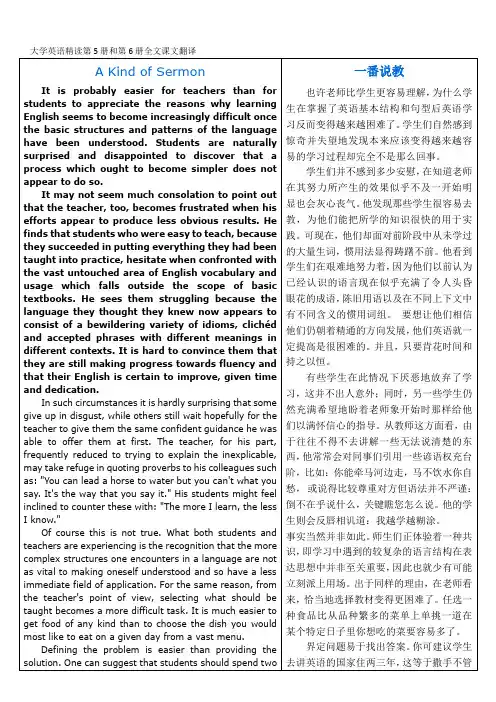
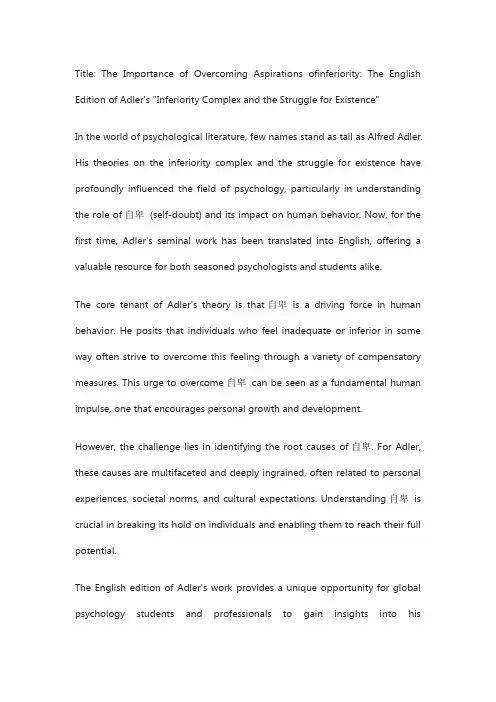
Title: The Importance of Overcoming Aspirations ofinferiority: The English Edition of Adler's "Inferiority Complex and the Struggle for Existence"In the world of psychological literature, few names stand as tall as Alfred Adler. His theories on the inferiority complex and the struggle for existence have profoundly influenced the field of psychology, particularly in understanding the role of自卑(self-doubt) and its impact on human behavior. Now, for the first time, Adler's seminal work has been translated into English, offering a valuable resource for both seasoned psychologists and students alike.The core tenant of Adler's theory is that自卑is a driving force in human behavior. He posits that individuals who feel inadequate or inferior in some way often strive to overcome this feeling through a variety of compensatory measures. This urge to overcome自卑can be seen as a fundamental human impulse, one that encourages personal growth and development. However, the challenge lies in identifying the root causes of自卑. For Adler, these causes are multifaceted and deeply ingrained, often related to personal experiences, societal norms, and cultural expectations. Understanding自卑is crucial in breaking its hold on individuals and enabling them to reach their full potential.The English edition of Adler's work provides a unique opportunity for global psychology students and professionals to gain insights into hisgroundbreaking theory. This translation not only preserves the original meaning and essence of Adler's work but also makes it accessible to a wider audience, facilitating a deeper understanding and appreciation of自卑and its impact on human behavior.For students, this book serves as a valuable guide in exploring the complexities of自卑and how they manifest in everyday life. It challenges readers to question their own assumptions about自卑and encourages them to embrace a more holistic view of human behavior.Moreover, for experienced psychologists, this translation offers a new perspective on Adler's theory and its applications in modern clinical settings. It prompts a reexamination of their practices and a renewed focus on自卑as a critical factor in psychological well-being.In conclusion, the English edition of Adler's "Inferiority Complex and the Struggle for Existence" is a timely and valuable addition to the field of psychology. It not only preserves the original insights of one of the discipline's pioneers but also broadens their reach, encouraging a deeper exploration of 自卑and its transformative potential in human lives.。
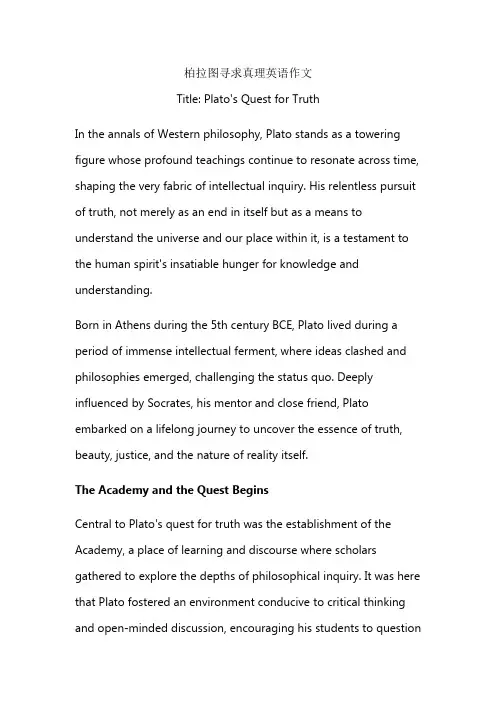
柏拉图寻求真理英语作文Title: Plato's Quest for TruthIn the annals of Western philosophy, Plato stands as a towering figure whose profound teachings continue to resonate across time, shaping the very fabric of intellectual inquiry. His relentless pursuit of truth, not merely as an end in itself but as a means to understand the universe and our place within it, is a testament to the human spirit's insatiable hunger for knowledge and understanding.Born in Athens during the 5th century BCE, Plato lived during a period of immense intellectual ferment, where ideas clashed and philosophies emerged, challenging the status quo. Deeply influenced by Socrates, his mentor and close friend, Plato embarked on a lifelong journey to uncover the essence of truth, beauty, justice, and the nature of reality itself.The Academy and the Quest BeginsCentral to Plato's quest for truth was the establishment of the Academy, a place of learning and discourse where scholars gathered to explore the depths of philosophical inquiry. It was here that Plato fostered an environment conducive to critical thinking and open-minded discussion, encouraging his students to questioneverything, including the most cherished beliefs and assumptions of the day.The Allegory of the CaveOne of Plato's most enduring contributions to the search for truth is the Allegory of the Cave, a parable that vividly illustrates the limitations of human perception and the challenges we face in apprehending reality. In this allegory, individuals are chained in a cave, facing a wall, unable to turn around or see the true source of the shadows cast upon the wall. These shadows, representing mere appearances, are mistaken for reality by the prisoners. Plato's message is clear: true knowledge requires escaping the constraints of our sensory experience and embracing the idea of forms—eternal, unchanging realities that transcend theever-changing world of appearances.The Theory of FormsBuilding upon the Allegory of the Cave, Plato developed the Theory of Forms, which posits the existence of an ideal,non-physical realm of absolute truth, beauty, goodness, and justice. According to Plato, the world we perceive through our senses is but a flawed reflection of these perfect forms. Our task, as seekersof truth, is to ascend from the realm of appearances to the realm of forms, where true knowledge and understanding reside.The Socratic MethodIntegral to Plato's quest for truth was the adoption and refinement of the Socratic Method, a dialectical approach to inquiry that involves posing questions designed to elicit contradictions in one's beliefs or assumptions, ultimately leading to self-correction and a deeper understanding of the subject matter. Through this method, Plato aimed to strip away falsehoods and expose the true nature of things, much like a sculptor removes excess material to reveal the statue within the block of marble.Legacy and ImpactPlato's quest for truth has had a profound impact on Western thought, influencing generations of philosophers, scientists, and thinkers. His ideas about the nature of reality, the importance of reason over sensation, and the value of critical thinking continue to shape our understanding of the world and our place within it. In the end, Plato's legacy lies not just in the specific doctrines he expounded but in the spirit of inquiry and intellectual curiosity he inspired, urging us all to embark on our own personal quests for truth, wherever it may lead.。
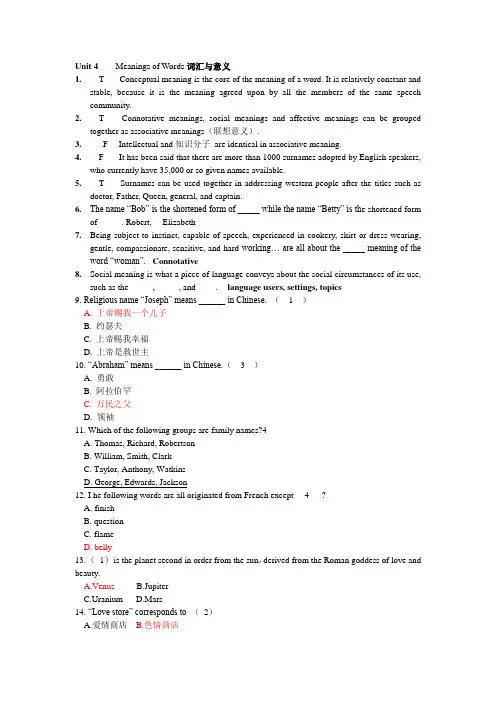
Unit 4Meanings of Words词汇与意义1.__T___ Conceptual meaning is the core of the meaning of a word. It is relatively constant andstable, because it is the meaning agreed upon by all the members of the same speech community.2.__T___ Connotative meanings, social meanings and affective meanings can be groupedtogether as associative meanings(联想意义).3.___F__ Intellectual and知识分子are identical in associative meaning.4.__F___ It has been said that there are more than 1000 surnames adopted by English speakers,who currently have 35,000 or so given names available.5.__T___ Surnames can be used together in addressing western people after the titles such asdoctor, Father, Queen, general, and captain.6.The name “Bob” is the shortened form of _____ while the name “Betty” is th e shortened formof _____. Robert,Elizabeth7.Being subject to instinct, capable of speech, experienced in cookery, skirt or dress wearing,gentle, compassionate, sensitive, and hard-working… are all about the _____ meaning of the word “woman”.Connotative8.Social meaning is what a piece of language conveys about the social circumstances of its use,such as the _____, _____, and ____.language users, settings, topics9. Religious name “Joseph” means ______ in Chinese. (1)A. 上帝赐我一个儿子B. 约瑟夫C. 上帝赐我幸福D. 上帝是救世主10. “Abraham” means ______ in Chinese.(3)A. 勇敢B. 阿拉伯罕C. 万民之父D. 领袖11. Which of the following groups are family names?4A. Thomas, Richard, RobertsonB. William, Smith, ClarkC. Taylor, Anthony, WatkinsD. George, Edwards, Jackson12. I he following words are all originated from French except __4___?A. finishB. questionC. flameD. belly13. (1)is the planet second in order from the sun,derived from the Roman goddess of love and beauty.A.VenusB.JupiterC.UraniumD.Mars14. “Love store” corresponds to (2)A.爱情商店B.色情商店C.爱心商店D.友爱商店15. T he word in British English for “faculty” is (3)A.departmentB.stuffC.staffD.teacher16.Religious name “ John ” means ___4___ in Chinese.A. 上帝是神圣的B. 约翰C. 上帝的朋友D. 上帝的恩赐17. “ Oscar ” means ___3____ in Chinese.A. 奥斯卡B. 天赐之盾C. 天赐之矛D. 天赐之剑18. “Brown paper” corresponds to _______.(4)A.秘密文件B.棕色纸C.揭露社会黑暗的报纸D.牛皮纸19. The British English equivalent for “私立学校” is . 1A. public schoolB. council schoolC. private schoolD. grade school20.A meddlesome person who pries into others' affairs is called a _______. ( 2 )A. busmanB. busybodyC. ladies' manD. do-gooder21. “Statesman” and “politician” are mainly distinguished by their (3 ) meaning.A.connotative B.conceptual C.social D.reflected22. Black tea” corresponds to ( ) in Chinese.3A.绿茶B.黑茶C.红茶D.青茶23. ( ) can be used as titles preceding surnames.1A.Judge B.Manager C.Teacher D.DirectorUnit 5 Idioms, proverbs and Allusions成语、谚语和典故1. __F___ Proverbs are implied or indirect references to characters or events from culture: literature, legends, history, religion, sports, etc.2. Translate the following sentences.•1). Diamond cut diamond(棋逢对手);•2)Two can play the game(孤掌难鸣);•3)A new broom sweeps clean(新官上任三把火);•4)The grass is greener on the other side of the hill(这山望着那山高);•5)Putting the cart before the horse(本末倒置);•6)Justice has long arms(天网恢恢,疏而不漏);•7)Don‟t try to teach your grandmother to suck eggs(不要班门弄斧);•8)Beauty lies in the love‟s eyes(情人眼里出西施);•9)One cannot make an omelette without breaking eggs。
Unit 5 成语,谚语和典故Section 1. Definitions1. Idiom :•Definition: an idiom is a construction or expression which has a meaning different from the literal one or not according to the usual patterns of the language.•成语是语言中经过长期使用、锤炼而形成的固定短语。
•它是比词的含义更丰富而语法功能又相当于词的语言单位,而且富有深刻的思想内涵,简短精辟易记易用。
•常常附带有感情色彩,包括贬义和褒义。
•Practice makes perfect. 熟能生巧Section 1. Definitions2. Proverb :•Definition: proverbs are short sayings of folk wisdom--of well-known facts or truths--expressed briefly and in a way that makes them easy to remember.•谚语是熟语的一种。
是流传于民间的比较简练而且言简意赅的话语。
多数反映了劳动人民的生活实践经验,而且一般都是经过口头传下来的。
它多是口语形式的通俗易懂的短句或韵语。
•Once bitten, twice shy.Section 1. Definitions3. Allusion典故•Definition:Allusions are implied or indirect references to characters or events from culture: literature, legends, history, religion, sports, etc.•诗文等作品中引用的古书中的故事或有出处的词句。
A Modest Proposal(一个温和的建议)[1] It is a melancholy Object to those, who walk through this great Town, 1 or travel in the Country, when they see the Streets, the Roads, and Cabin-Doors, crowded with Beggars of the female Sex, followed by three, four, or six Children, all in Rags, and importuning every Passenger for an Alms.对于走过这座大城市,或在乡间旅行的人,他们看到的这些景象真是悲凉:街上、马路上、茅屋内挤满了女乞丐,后面跟着三个、四个或六个衣衫褴褛的孩子,向每个路人强要施舍。
These Mothers instead of being able to work for their honest livelihood, are forced to employ all their time in Strolling, to beg Sustenance for their helpless Infants, who, as they grow up either turn Thieves for want of work, or leave their dear native Country to fight for the Pretender in Spain, 2 or sell themselves to the Barbadoes.这些母亲无法靠诚实劳动谋生,被迫终日游荡去养活那些无助的孩子,这些孩子长大后要么因找不到工作而沦为小偷,要么背井离乡去为西班牙那个觊觎王位者卖命,也许还会卖身到巴巴多斯。